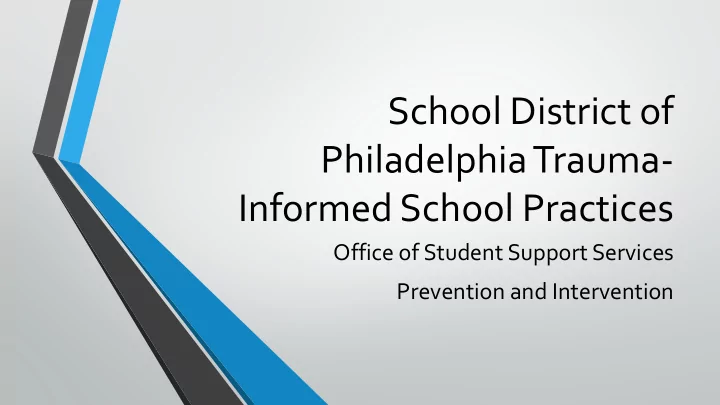

School District of PhiladelphiaTrauma- Informed School Practices Office of Student Support Services Prevention and Intervention
Agenda • Office of Prevention and Intervention • MTSS Framework and Trauma • SDP Plan for Trauma Sensitive Schools
Prevention & Intervention • Mission - Empower schools to build strengths and resiliency that open pathways to learning • Vision - Spreading the power of compassionate relationships to improve educational outcomes
Values • Leadership: The courage and capability to shape a better learning environment • Trauma-informed: Advance safe, compassionate and effective schools • Strength-based: Building on abilities creates resiliency • Child-Centered: Focus on the child and they will grow • Relational: Move systems through the power of genuine relationships • Change Agent: Embrace and drive change • Strategic: Investment in systematic and sustainable practices
Who Is on Our Team Prevention & Intervention Liaisons James Adams Deputy Chief, Lori Paster Networks 6 & 7 lpaster@philasd.org Johanna Agnew Networks 8 & 9 Director, Trauma-Informed School Practices, John Hale Iesha Brown-Pygatt Networks 1 & Opportunity ibrownpygatt@philasd.org Damian Vargas Networks 1 & Innovation Tania Leonard Director, Prevention and Intervention, Networks 4 & 5 Latesha Watson Korbin Reynolds lwwatson@philasd.org Networks 2 & Autonomy 215-400-5661 Tara Ryans Network Turnaround
Supports & Services Prevention & Intervention Student Rights & Responsibilities School Climate & Safety Student Enrollment & Placement Student Health Services Family and Community Engagement
Partnerships • Philadelphia University • Lakeside Global Institute • United Way • CBH/ DBH- STEP (Support Team for Education Partnerships)
Trauma Sensitive Schools • Recognize the prevalence and impact of traumatic occurrence in students’ lives • Create a flexible framework that provides universal supports, is sensitive to the unique needs of students and is mindful of avoiding retraumatization
DBH Continuum of Care School-Based Behavioral Tier 3 Health Program 1 –5% Trauma Focused Therapy SAP Check & Connect Tier 2 Check-In Check Out Social Skills Group 10 – 15% Behavior Plan Tier 1 Positive Reinforcement 80 – 85% Restorative Discipline Classroom Management Culturally Responsive, School-Wide Social Skills Instruction Trauma-Informed Practices - Compassionate and Neurologic
Wisconsin DPI Why use the PBIS framework for trauma- sensitive schools? The fundamental purpose of PBIS is to make schools more effective & equitable learning environments. Rob Horner, Co-Director of the OSEP Technical Assistance Center for PBIS Predictable Positive Consistent Safe WI Department of Public Instruction Trauma-Sensitive Schools Resources http://sspw.dpi.wi.gov/sspw_mhtrauma
Current Supports from OPI • Training • Climate Support Staff • Teachers • Principals • Counselors • Schools • PI Staff • SPO • School Support • Readiness Leveling
Tier 1 TIP – PBIS Schools • Trauma Readiness Assessment • Baseline Trauma Awareness Training • Training and Coaching • Adding Trauma Lens to PBIS School Wide Practices • Behavior Expectations – Restorative vs. Punative • Safety Connections and Assurance • Social Emotional Competency
Tier 1 TIP – Non-PBIS Schools • Trauma Readiness Assessment • Leadership Meetings • Staff Interviews Observations • Transformative Wellness (Co-Regulation) • Baseline Trauma Awareness Training • Training and Coaching
Tier 2 TIP – All Schools • Trauma Sensitive Schools (Compassionate Schools) • Social and Emotional Curriculum • Trauma Lens in • Tier 2/3 Meetings • ITMs • Behavior and Safety Planning
District Level TIP • Office of Student Support Services Training • MTSS, Hearing Officers, FACE, OPI • Office of Specialized Services • School Psychologists • Nurses • Curriculum –Teacher Coaches
Questions • What did you like? • What would you change? • What would be your recommendations for next steps?
Recommend
More recommend